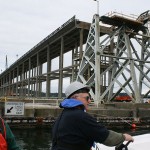 Capt. John DeFillippo, CHMP, EMT-B
Capt. John DeFillippo, CHMP, EMT-BDoes your company have employees that work on, near or over water? Hazardous waste site and emergency response workers, those in the construction trades, surveyors and bridge inspection/repair crews are but a few occupations where this applies. OSHA regulations (29 CFR 1926.106 for example) cover the safety of such workers including training and protective equipment requirements. Other federal and state (USCG and TSA) regulations may also apply to your operation. For example, if you are working over water, such as bridge work, you must have a rescue skiff at the ready, with trained personnel to operate it, in case someone falls in. Working at piers, refineries or other marine facilities may entail very specific security requirements.
Water can be unforgiving of carelessness. As a veteran of the U.S. Coast Guard, an EMT and a licensed captain working in the marine salvage industry, Ive seen plenty of tragedies on the water. Nearly all were avoidable. Here are some essential questions to help you assess your water safety knowledge:
- Is everyone wearing personal flotation devices? Are they the right type, worn correctly, and U.S. Coast Guard approved?
- What is the water temperature? In April in the mid-Atlantic region, the water is about 45 degrees F which means you can last about 15 minutes before hypothermia sets in.
- Do you understand the risk of hypothermia? Even if the water is at 80 degrees F, its the same as being in air of 42 degrees F. And, water removes heat from the body 25 times faster than air of the same temperature.
- Does everybody know how to swim? What to do if caught in a current? Will they know to swim parallel to the shore or go with it until you out of it? You can't swim against a current, even a gentle one, for very long, so dont try.
- If someone does fall in, whats the plan? Formulating a plan when you hear the splash is too late! Having the proper rescue equipment and understanding how to use it is essential.
- Who is trained in CPR and Basic First Aid? Knowing what to do in an emergency saves lives! Too many would-be rescuers become victims themselves, so leave water rescue to those who have the training and tools.
- Is the boat operator trained? Employers who would never think of allowing an untrained person to operate a crane often have no problem letting someone without proper training operate a boat on a navigable waterway. Many states, including New Jersey, now require all operators of power-driven vessels to take an approved Safe Boating Course. Fines can be steep and may get the vessel impounded.
The Emilcott Training Institute offers many training programs that can help keep workers safe, including an 8-hour Water Safety and Boating Basics that is approved by the NJ State Police and recognized in several other states as well. Fall Protection, Water Safety and Red Cross CPR and Basic First Aid are also offered in-house or on-site. If you have ANY questions about water safety at work, give Emilcott a call or comment below.


